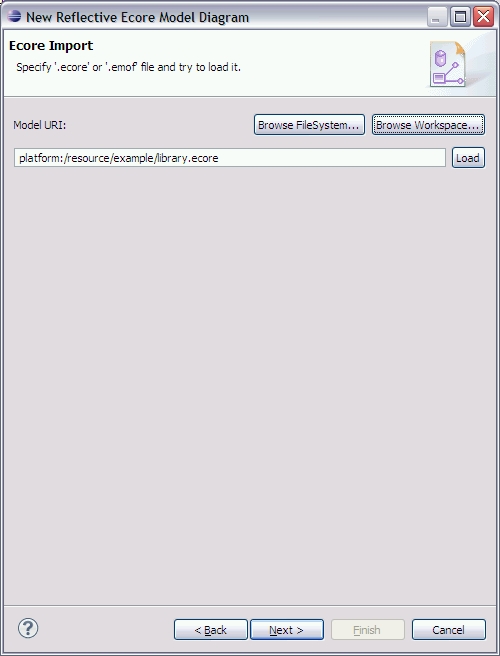Create a dynamic instance diagram from .ecore
Introduction
You can use Reflective Ecore Model Diagram Editor to view and edit an
instance for any ecore model (.ecore) file.
There are two ways to create a new instance from a .ecore file.
Step1. Open .ecore file using the ecore file editor
Normally, by double clicking .ecore file, the default ecore tree editor is opened.
Step2. Right click on the root EClass and select "Create Dynamic Instance Diagram..."
Right click on the root EClass of your model that you would want to
instantiate, and select "Create Dynamic Instance Diagram..." menu. The
instantiated object is going to be the root diagram element
corresponding to the diagram canvas.
Step3. Specify the names of .xmi_diagram and .xmi files
Reflective Ecore Model Diagram Editor saves notation and semantic models
in .xmi_diagram and .xmi files, respectively. Specify their names by
following the wizard. Then, the editor is opened.
Create a new instance from DynamicGMFModelWizard
you can create and edit an instance of ecore dynamically by using
DynamicGMFModelWizard.
Step 1. Invoke DynamicGMFModelWizard
Select "File>New>Other...". You can find "Reflective Ecore Model
Diagram" wizard under "Examples" category as shown below.
Step2. Select a dynamic model importer
Select "Ecore model" and push "Next".
Step 2. Specify the names of .xmi_diagram and .xmi files
Reflective Ecore Model Diagram Editor saves notation and semantic models
in .xmi_diagram and .xmi files, respectively. Specify their names by
following the wizard.
Step 3. Specify .ecore file
Specify .ecore file which is the meta-model of the creating
instance, and press "Finish" button.
Step 4. Specify the root element
Finally, specify the root EClass of your model that you would want to
instantiate. The instantiated object is going to be the root diagram
element corresponding to the diagram canvas.
Then, the editor is opened.







